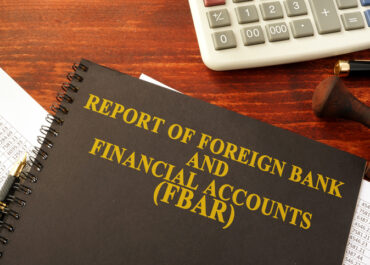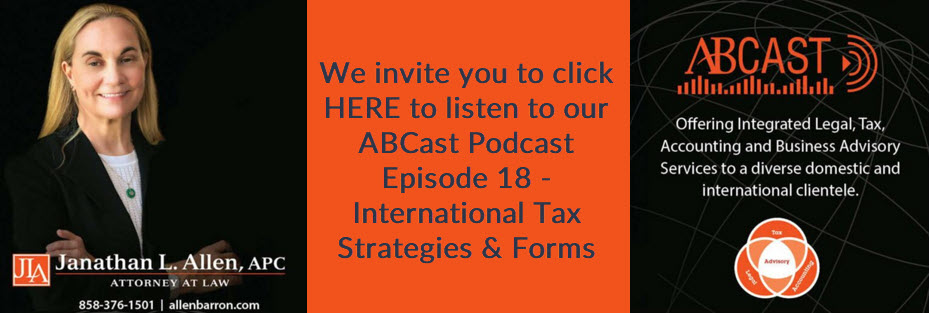Welcome to part 1 of our Allen Barron International Tax Primer for US Taxpayers and Expatriates. The United States is one of the few countries in the world that taxes its citizens on their worldwide income. US taxpayers are required to report all sources of income, worldwide, not just income that you earn domestically here in the states or while you’re in the United States. The tax approach of the United States is known as the worldwide income concept. What international tax issues and challenges concern you the most?
It surprises many US citizens who have moved overseas , often referred to as “expatriates” or “expats”, to learn that if one is earning income overseas (not residing in the US), that person still has an obligation to file a US tax return and pay appropriate income taxes to the United States unless and until they renounce their United States citizenship altogether.
 Another important concept to consider at the outset of this international tax primer for US taxpayers and expatriates is the concept of a “US Person.” US persons must file a tax return each year and pay income and other taxes to the US Treasury. What is a “United States Person” or “US Person” as defined in our laws and the tax code? In essence, who is required to file a tax return to the Internal Revenue Service (IRS)?
Another important concept to consider at the outset of this international tax primer for US taxpayers and expatriates is the concept of a “US Person.” US persons must file a tax return each year and pay income and other taxes to the US Treasury. What is a “United States Person” or “US Person” as defined in our laws and the tax code? In essence, who is required to file a tax return to the Internal Revenue Service (IRS)?
Any IRS communication and the tax code itself refers to a “United States person” or “US persons” as taxpayers. Who is considered to be a “US person”? The IRS classification of “United States Person” or “US persons” includes any resident or citizen of the United States, a domestic partnership, a domestic corporation, any estate (other than a foreign estate), as well as any trust where US persons have control authority and where a US Court has primary jurisdiction over the administration of that trust.
So the actual definition of “US Persons” is far broader and encompasses more types of people and entities than I think most people might actually consider from the perspective of US taxation and who is therefore required to file a US tax return and pay associated taxes.
How does the term “US person” (read: a person with the obligation to file a US Tax Return and file other appropriate disclosures and forms) apply to foreign nationals and non-US citizens? How do they qualify as a US person from a tax perspective?
In order to qualify as a US person as a foreign national or non-US citizen, there is the citizenship test, there is a green card test, but more importantly, there is a physical presence test as well. The physical presence test is one of the easiest concepts to understand when determining your obligations as a “US Person.” The physical presence test defines the tax status of anyone wo resides or is physically living in the United States, whether or not you are a citizen or a green card holder. Generally speaking, if you are physically in the United States for over 183 consecutive days in a calendar tax year, then essentially you are deemed to be a “US person,” a resident of the United States required to file a tax return with the IRS and hence taxable on your income worldwide.
In summary, we’ve established that all US persons are required to file a tax return to the IRS and pay appropriate taxes on worldwide income. We’ve learned that it is not simply a US citizen who is required to file a tax return, but any “US person” which includes many expatriates, non-US citizens, resident aliens (any non-US citizen who resides in the US for more than 183 consecutive days in a given tax year), and green card holders.
Foreign Bank Account Report or FBAR – the FinCEN Report of Foreign Bank and Financial Accounts Form 114
 What is an FBAR (Form 114) and who is required to file an FBAR each year? The FBAR, FinCEN Form 114 is really the reporting of foreign currency cash type assets. If you are a US person you are required to disclose information regarding any bank or investment account outside of the United States in which you have control or signatory interest. The information contained within the FBAR (Form 114) relates to the name of the bank, the address of the bank, the date that the account was opened and the highest amount held in that account during the calendar year, for which the FBAR is reporting.
What is an FBAR (Form 114) and who is required to file an FBAR each year? The FBAR, FinCEN Form 114 is really the reporting of foreign currency cash type assets. If you are a US person you are required to disclose information regarding any bank or investment account outside of the United States in which you have control or signatory interest. The information contained within the FBAR (Form 114) relates to the name of the bank, the address of the bank, the date that the account was opened and the highest amount held in that account during the calendar year, for which the FBAR is reporting.
So the FBAR essentially reports the cash, mutual funds, savings, investments, things of that are liquid in nature that are required to be reported because of the financial liquidity with which the asset is held. This includes non-US cryptocurrency and/or Non-Fungible Token or NFT holdings.
The FBAR or FinCEN Report of Foreign Bank and Financial Accounts form 114 is due on April the 15 that follows the calendar end of the associated tax year. The FBAR or Form 114 must be submitted electronically using the BSA E-Filing System.
Who Has to File an FBAR / FinCEN Form 114?
It is our hope that most US taxpayers are by now at least aware of the FBAR FinCEN Form 114, but who has to e-file this form? The FBAR / FinCEN Form 114 is where US persons (including resident aliens and expatriates) report bank accounts and insurance policies, and mutual investments, liquid holdings, and a variety of other offshore holdings. For example, on an FBAR / FinCen Form 114 you are required to report any foreign bank account or signatory authority which exceeds $10,000 at any point within the associated calendar year, even the $10,000 threshold is exceeded for only an hour or a day. (Note: most of the information reported on the FBAR / FinCEN Form 114 will also be reported on IRS Form 8938, which we will cover later in this report).
The Bank Secrecy Act or BSA
The Bank Secrecy Act or BSA was established to provide the US (and the IRS) with greater “financial transparency” into the accounts and transactions of US persons around the world. The BSA is tasked with the detection of US persons who may attempt to hide income and assets outside of the United States as well as those who attempt to launder criminal proceeds within the United States and abroad.
The Pincer Strategy of FATCA Reporting Requirements and The Responsibility of US Persons with Offshore Liquid Assets to File an FBAR (FinCEN Form 114)
It is important to understand that the world has substantially changed based upon the impact of the Foreign Account Tax Compliance Act or FATCA. According to the IRS itself, FATCA requires that “foreign financial institutions and certain other non-financial foreign entities report on the foreign assets held by their U.S. account holders (US persons) or be subject to withholding on withholdable payments.” This includes any Qualified Intermediary (QI), Withholding Foreign Partnership (WP) Withholding Foreign Trust (WT) and information regarding US persons who own a passive Non-Financial Foreign Entity (NFFE) as well as US persons who own a specific debt or equity interest in Owner-Documented Foreign Financial Institutions (ODFFIs).
The IRS requires foreign banks, crypto exchanges, investment houses and all financial institutions to provide information directly to the IRS about any financial account controlled by US persons on the IRS Form 8966.
Therefore, the IRS is receiving specific information about the accounts, investments, real estate and transactional data associated with US persons directly from institutions and other sovereign tax agencies around the world. This information is tied to a specific US tax identification number or social security number. This combined with other tactics established under the BSA provide the IRS with a substantial picture of the financial activities of US persons around the world.
The resulting pincer strategy effectively compares the information provided by financial entities and global sovereign tax agencies with the information provided by the taxpayer on FBAR FinCEN Form 114 and other disclosures within the tax return. It has become much easier for the IRS to identify non-reported foreign income and/or assets and to pursue an audit as well as criminal tax evasion.
In summary, the United States has implemented FATCA as well as the BSA and other initiatives to effectively pressure any foreign bank or financial institution and cooperating foreign sovereign tax agencies to provide extensive account and transactional data on the global assets, holdings and transactions of US persons. The IRS receives detailed financial and transactional information specifically tied to the taxpayer ID of a US person. The IRS has only to compare the information received from foreign agencies, exchanges and financial institutions with the tax return and FBAR of the US person to identify those who have under-reported or failed to report their offshore or foreign taxable income and/or liquid holdings, transactions and assets.
The IRS has recently confirmed the implementation of new technology, personnel and strategies to assist with detecting and pursuing US persons who participate in schemes or efforts to conceal foreign income, assets and transactions from the IRS.
Offshore or Foreign Assets and Income
What are some of the typical offshore or foreign assets, interests and resulting income that a US taxpayer may have? How are those foreign assets and income reported to various US agencies and the IRS?
Perhaps the most obvious categories to discuss in an international tax primer would involve the tax perspective of someone who holds an interest in an offshore corporation. Individuals that have an ownership in a foreign corporation generally know there are associated reports and forms associated with a US tax return.
However, there are individuals (particularly in the UK) that may hold a directorship within a foreign corporation without the corresponding understanding that those directorships are actually holders of the company. They may nor perceive that serving as a director may make them a shareholder in that corporation. This is a fairly common example of US taxpayers who may not understand that they do hold foreign interests in corporations outside of the US.
Foreign corporate ownership (depending on the percentage of ownership and the corporation ownership interest itself) is generally reported on form 5471. The IRS form 5471 is the equivalent of filing a corporate tax return here in the states. US taxpayers who are directors, officers and/or shareholders in specific types of foreign corporations must file the Form 5471 and associated schedules.
The differentiation is that the income that inures to the balance or to the profit and loss of the 5471 is then multiplied by the owner’s percentage interest and recorded and reported on that individual’s individual US income tax return.
So the outlier for foreign corporations is while the corporation may make money, it may not distribute dividends or profits to you the shareholder, but you may be taxed on it anyway. So it’s critically important if you have an interest in a foreign corporation, that you obtain the financial statements of that particular entity and any associated foreign tax returns in order to properly file the Form 5471, which will then give you the K1 information which is to be reported on your individual US tax return.
The Percentage of a US Taxpayers’ Interest in a Foreign Corporation Is a Factor in the Associated US Tax Return

The percentage of an ownership interest relating to foreign corporations is the determining factor in whether or not foreign 5471 will have to be filed. If you have a 10% ownership in an entity, then there is a general filing requirement to file the 5471. However, there are additional filing requirements that are additive to the 10% threshold.
A common factor in these returns is related to a constructive ownership rule under the IRS and the regulations that relate to family members of that US taxpayer who may have ownership interests within that same foreign corporation as well. So while one individual US taxpayer may only hold 5% of the ownership may believe that level falls below the 10% reporting threshold, there may be other “family” interests which apply. Perhaps the brother, sister or a parent also owns stock within that entity. The constructive ownership rules will inure to US taxpayers collectively based upon the total percentage of interest the “family” owns. The cumulative holdings of a family (versus a single US taxpayer in this example) will be the determining factor as to whether or not form 5471 needs to be filed.
The issue becomes far more complex when the entity becomes what’s known as a controlled foreign corporation. A controlled foreign corporation is when an a US taxpayer (or taxpayers) collectively own 50% or more of a foreign entity, then the entire landscape of the rules and regulations and foreign reporting changes. Therefore, it’s really important to determine what ownership you have and whether or not the entity is a controlled foreign corporation that will in turn determine and define the foreign reporting requirements you’ll have on an individual US tax return.
What Other Types of Foreign Entities Trigger IRS Reporting and Tax Issues?
One of the most challenging entities to deal with from the perspective of a US taxpayer would involve foreign partnerships. Just like partnerships here in the states, you don’t have to have a formal agreement with which to create a partnership. It is important to note US law and tax codes may establish a “partnership” and associated reporting and taxation requirements even when no formal agreement or entity exists.
One example might be a US taxpayer who owns a house in a foreign country with other family members. One might not consider this foreign asset to be a “partnership” and might simply (and wrongfully) presume this asset was a Schedule E reporting requirement. When, in fact, from the perspective of the IRS the asset would be considered as foreign ownership in a partnership requiring the filing of IRS Form 8865, in addition to the required Schedule E. This is a common issue of family-owned real estate and other offshore assets.
Important international tax primer summary: A US taxpayer must consider each specific type of foreign asset(s) in their portfolio. If there is some form of commonality of ownership it is important to review the specific details to determine whether or not there is a foreign partnership that may come into play and require additional foreign reporting requirements.
 While there are no equivalent entities to the Limited Liability Companies (LLCs) that we have here in the US, there are the foreign limited companies. There is often confusion surrounding what are referred to as “limited companies” in the rest of the world, compared to the unique structure of an LLC here in the US.
While there are no equivalent entities to the Limited Liability Companies (LLCs) that we have here in the US, there are the foreign limited companies. There is often confusion surrounding what are referred to as “limited companies” in the rest of the world, compared to the unique structure of an LLC here in the US.
The rest of the world really doesn’t have limited liability companies. They have limited companies, and those companies are generally limited by the number of stocks or shares of stock that can be issued. In the case of offshore ownership in a foreign limited company, the requirement is generally to file IRS Form 8858, which allows a US taxpayer to essentially report the same type of information that would be reported if someone held shares in a foreign corporation. It is important to note US regulations and tax law recognizes the fact that the limited company is not a corporation, it’s something other than a corporation.
Finally, we should consider foreign trusts. It is critical for US taxpayers to understand the nature of offshore or foreign assets and income and what type of entity you’re actually dealing with, particularly when it relates to foreign trusts. The reporting requirements and taxation associated with foreign trusts are quite complex. The failure to properly account for the ownership of a foreign trust in a US tax return exposes the taxpayer to substantial penalties and much higher tax rates.
One of the best examples of foreign trust complications may be the superannuation plans (pension plans, often referred to as “supers”) that are heavily in use throughout Australia. In Australia, these superannuation plans give their resulting foreign trusts (read: Australian residents and citizens) enormous tax savings and deferrals. However, The US tax code and the IRS look at these superannuation plans and treats them as a foreign grantor trust. Any income that is earned in a foreign grantor trust is to be reported on IRS Form 3520. Unfortunately, the income that’s earned from these foreign trusts is taxed at a much higher rate than even the present highest individual US income tax rate of 36%.
Income from a foreign trust can be taxed as high as 55% of whatever income is inured to the US taxpayer from the foreign trust. The foreign trust can be superannuation, foreign pensions or a number of other types of entities. Foreign family trusts are another example of an offshore asset many US taxpayers may mischaracterize or report. If you are the beneficiary of a foreign family trust it will have a substantial impact on your US tax return as well.
You can see part 2 of our Allen Barron International Tax Primer for US Taxpayers and Expatriates this Wednesday, August 23rd.
We invite you to learn more about the integrated tax, legal, accounting and business consulting services of Allen Barron and contact us or call today to schedule a free consultation at 866-631-3470.






